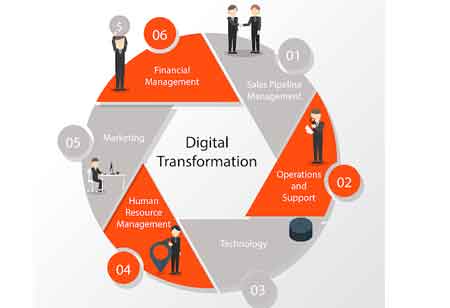THANK YOU FOR SUBSCRIBING
6 Factors that will Lead to a Successful Digital Transformation
Legacy systems, regulatory hurdles, employee skill sets, cultural resistance to change etc are some of the common challenges that stunts digital transformation

By
Apac CIOOutlook | Wednesday, March 11, 2020
Stay ahead of the industry with exclusive feature stories on the top companies, expert insights and the latest news delivered straight to your inbox. Subscribe today.
Legacy systems, regulatory hurdles, employee skill sets, cultural resistance to change etc are some of the common challenges that stunts digital transformation
Fremont, CA: Almost all enterprise organizations have embraced the digital transformation and are either engaging in some form of change or planning one. But how these implementations are progressing, is another question. According to a new survey that analyzed 293 responses to the poll of key IT decision-makers at US-based companies, 36 percent of organizations are behind schedule, 14 percent ahead of schedule, and 6 percent still being stalled. This survey was conducted by Hanover Research and commissioned by AHEAD, an enterprise cloud provider.
The common challenges to digital transformation as per the survey were outdated systems, regulatory obstacles, employee skill sets, cultural resistance to change, internal politics, lack of funding commitment, underlying IT infrastructure, poorly performing vendors, and lack of digital strategy.
Survey respondents also identified the most difficult challenges, which included legacy system complexity/technical debt topping the list with 24 percent, lack of funding commitment was second at 13 percent, and internal politics came in third at 12 percent.
For a successful digital transformation in an organization, here are six tips to implement:
Established Digital Work Plan
Ninety-two percent of changes that are ahead of schedule has an established strategy and work plan that includes IT infrastructure and operations.
Coordination between Infrastructure and App
Developing an integrated DevOps approach by a company will likely see more success with the aforementioned initiatives. The survey showed that 43 percent were more likely to see progress in digital transformation efforts, and to avoid bottlenecks, companies should audit DevOps functions before undergoing digital transformation.
Dedicated Intelligent Operations
The survey found that companies that monitor IT performances in real-time and troubleshoot issues quickly are 24 percent likely to succeed with the digital change. Also, businesses having the confidence to perform well with automation, monitoring, hybrid cloud models, and integrated security will potentially experience a successful digital transformation.
Committed Leadership
For a successful digital transformation in a company, ensure that someone leads it from the c-suite. According to the survey, 83 percent of digital transformation that is on track or ahead of schedule is led by a CIO, CEO, CDO, or CTO.
Integrated IT Infrastructure
According to the survey, integrating IT infrastructure in a business plays a significant role in the digital transformation, with 36 percent more likely to have a successful transformation as infrastructure is the backbone of a digital change initiative.
Full-Scale Change Approach
Partial transformation does not generate much impact as digital operations are often interconnected. Transformations that are on track are 30 percent more likely to be full-scale change initiatives.
See Also:





